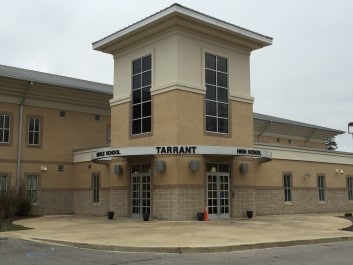Bilingual Ed in the South: The Hurdles
Tarrant High School junior Angelina Baltazar (left), her mother Maria Baltazar, and ESL teacher Anne Pace. The Baltazars are from Guatemala, but Maria's first language was not Spanish -- it was an isolated Mayan language from western Guatemala and eastern Mexico.
Students who don’t speak English as their first language, or “language minorities,” are some of the most socially and economically disadvantaged in our nation and in the South. So far in our series we’ve looked at two dual-language schools (a more common description since the phrase “bilingual schools” became politically loaded). Now, WBHM’s Dan Carsen explores why that approach and educating language-minorities in general are challenging here. The story starts in a quiet classroom after school. Read more below, or listen above.
Angelina Baltazar is from Tarrant, Alabama, by way of Guatemala. She introduces herself in moderately accented English.
“I’m in eleventh grade right now. I’m about to become a senior. I’m happy … that I’m going to graduate high school. That’s my dream, since I was little.”
But this bright, hardworking kid isn’t happy about everything at her school. She says there are a lot of students like her in the Tarrant system who want – really need – much more help integrating into their new academic world. And one of the people helping with that agrees.
“There just aren’t enough teachers to accommodate the amount of children that are coming in right now,” says English as a Second Language (ESL) specialist Anne Pace.
That’s the case across much of the nation and the South. Finding qualified ESL or bilingual teachers is not easy. Government support for training, recruiting, and standardizing has been spotty. Pace herself admits to feeling underprepared. I ask her whether her Spanish is good, assuming the answer would be “yes,” but she laughs and then says, “Oh, it’s … it’s … I’m working on it. The kids teach me a lot.”
This specialized teacher pipeline is slow partly because the standards for which students get special services, and for which teachers can teach them, vary widely across states and even across districts. That makes establishing solid, consistent training programs trickier for universities.
But there are some commonalities, especially in the South. They’re just not the kind that increase the numbers of potential ESL or bilingual teachers. For example, every Southern state besides Texas has an officially “English-only” government, which can affect education policies directly and indirectly. Those states tend to favor English immersion over teaching language-minorities in their own tongues. Alabama is a straightforward example.
“We don’t have bilingual education,” says Dely Velez-Roberts, who’s bilingual herself and administers English-Learner programs for the state education department. “We have EL programs. But bilingual education – there’s not one school in our state.”
She says she’s unfamiliar with research showing that bilingual or dual-language education is often more effective in boosting long-term academic performance and English proficiency. There are at least three reasons why a Dely Velez-Roberts might not know about that research. First, she’s insanely busy. Alabama has more than 20,000 classified English Learners, but she and exactly three trainers travel the state to coach teachers with little experience but more and more language-minority students. “They’re begging for the training,” she says. Second: There isn’t much research on how Southern schools are adapting. And third, it might not matter: When I ask her whether politics might be influencing education policy, she initially answers in the affirmative, but a few moments later as she starts to explain, she decides not to continue.
I contacted a half-dozen Alabama school systems with large Latino populations directly to see if I could observe some ESL classes. Long story short: it never happened.
Back in Tarrant, Anne Pace says districts should at least have the option of trying a dual-language approach. Then she explains why she thinks Alabama politicians haven’t pushed for it.
“Maybe because they have never taught in a class. I think they should come visit us, and see the struggles. Know that a different approach would accommodate these students.”
Of course, these types of challenges, and others, are not limited to Alabama.
“In the South, you know, there are stigmas,” says Talia Palacio, who grew up Panamanian in Memphis. Now she helps run one of the only dual-language schools in Tennessee, a state that also favors English immersion. She describes a historical process other experts told me about too: In this monolingual society some call a “graveyard of languages,” stigma leads to more families losing their native tongues, which shrinks the pool of potential bilingual teachers in a self-perpetuating cycle.
“It does limit the education cohort or education candidacy,” Palacio says, “because you need to be able to language hop and decode with ease.”
That stigma against anything but English also leads to a surprising source of resistance to bilingual education: immigrant families themselves. One could forgive a hotel worker from rural Honduras for not knowing that learning math in Spanish actually helps kids learn English (believe it or not, immigrants, like most people, are not regularly reading research journals). But resistance from immigrants and elsewhere seems to be softening as more experts say English immersion – the most common approach in the South and the nation – has failed. One of them is Margarita Pinkos, longtime bilingual educator and former director of the U.S. Department of Education’s Office of English Language Acquisition under George W. Bush.
“Separate but equal has proven to be a disaster,” she explains. “If you do it only for ELL kids — these are the ones that are learning English — they never hear it from their peers. There is enough research, if we want to look at it. It’s just that, you know, a lot of people don’t want to see it.”
Whether or not schools implement those findings is more and more important. Ignoring the legal duties to educate these children regardless of language or immigration status, let alone any moral concerns, if our schools are not working for a large part of the population, a large part of the population is not working for everyone else.
We have more on those economic concerns in the fourth and final part of our series on language-minority education in the South. In Part One, we visited a dual language school making the approach in a poor neighborhood. In Part Two, we saw another language-based program that’s become a model in that state. Support for this series comes from The Equity Reporting Project: Restoring the Promise of Education, which was developed by Renaissance Journalism with funding from the Ford Foundation.
Park Fire in California could continue growing exponentially, Cal Fire officer says
Cal Fire has confirmed that over a hundred structures have been damaged in the Park Fire, which grew overnight near Chico, Calif. Difficult firefighting conditions are forecast through Friday night.
Checking in with Black voters in Georgia about the election, now that Biden is out
Some voters who could be key to deciding who wins Georgia. What do they think about Vice President Harris becoming the frontrunner in the race to be the Democratic nominee?
Tahiti’s waves are a matter of ‘life and death’ for surfing Olympics
Tahiti's Teahupo'o wave has a slew of riders for the Paris 2024 Olympics. NPR finds out why it's called one of the most dangerous waves.
Researchers are revising botanical names to address troubling connotations
Since the mid-1700s, researchers have classified life with scientific names. But some of them have problematic histories and connotations. The botanical community is trying to tackle this issue.
A spectacular opening ceremony wowed a global audience despite Paris’ on-and-off rain
The Paris Olympics opening ceremony wowed Parisians, fans and most everyone who was able to catch a glimpse of thousands of athletes floating down the Seine to officially begin the Games.
Kamala Harris faces racism and sexism as she moves closer to presidential nomination
As Vice President Kamala Harris ramps up her campaign for president, Republicans are trying out new — and old — attacks focused on her race and gender, including calling her a "DEI candidate."




